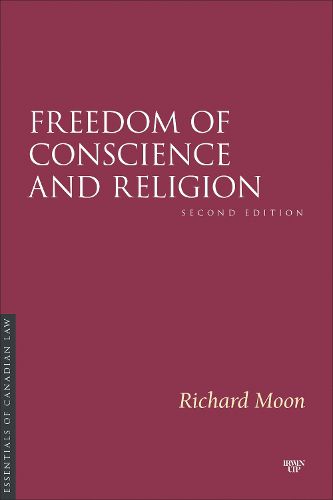Readings Newsletter
Become a Readings Member to make your shopping experience even easier.
Sign in or sign up for free!
You’re not far away from qualifying for FREE standard shipping within Australia
You’ve qualified for FREE standard shipping within Australia
The cart is loading…






This title is printed to order. This book may have been self-published. If so, we cannot guarantee the quality of the content. In the main most books will have gone through the editing process however some may not. We therefore suggest that you be aware of this before ordering this book. If in doubt check either the author or publisher’s details as we are unable to accept any returns unless they are faulty. Please contact us if you have any questions.
In their early decisions under the Charter of Rights and Freedoms, the Canadian courts described religious freedom as a liberty that protects the individual from state coercion in religious matters. According to the courts, the individual has both the right to practice his/her religion without state interference and the right not to be compelled by the state to perform a particular religions practice. However, in later judgments the courts have also, or instead, described religious freedom as a form of equality right that requires the state to remain neutral in religious matters - to not favour the practices and beliefs of one religious community over those of another.
Underlying the courts' judgments is a complex conception of religious commitment in which religion is viewed as both a personal commitment to a set of beliefs about truth and right and as a cultural identity. The challenge for the courts has been to fit this complex conception of religious commitment into a constitutional framework that relies on a distinction between individual choices or commitments that should be protected as a matter of liberty, and individual or shared attributes that should be respected as a matter of equality. The constitutional framework imposes this distinction between judgment and identity on the rich and complex experience of religious commitment.
$9.00 standard shipping within Australia
FREE standard shipping within Australia for orders over $100.00
Express & International shipping calculated at checkout
This title is printed to order. This book may have been self-published. If so, we cannot guarantee the quality of the content. In the main most books will have gone through the editing process however some may not. We therefore suggest that you be aware of this before ordering this book. If in doubt check either the author or publisher’s details as we are unable to accept any returns unless they are faulty. Please contact us if you have any questions.
In their early decisions under the Charter of Rights and Freedoms, the Canadian courts described religious freedom as a liberty that protects the individual from state coercion in religious matters. According to the courts, the individual has both the right to practice his/her religion without state interference and the right not to be compelled by the state to perform a particular religions practice. However, in later judgments the courts have also, or instead, described religious freedom as a form of equality right that requires the state to remain neutral in religious matters - to not favour the practices and beliefs of one religious community over those of another.
Underlying the courts' judgments is a complex conception of religious commitment in which religion is viewed as both a personal commitment to a set of beliefs about truth and right and as a cultural identity. The challenge for the courts has been to fit this complex conception of religious commitment into a constitutional framework that relies on a distinction between individual choices or commitments that should be protected as a matter of liberty, and individual or shared attributes that should be respected as a matter of equality. The constitutional framework imposes this distinction between judgment and identity on the rich and complex experience of religious commitment.